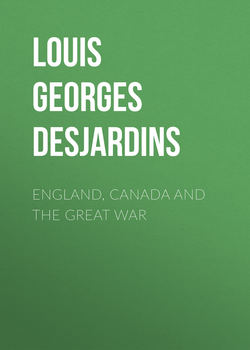Читать книгу England, Canada and the Great War - Louis Georges Desjardins - Страница 3
CHAPTER I.
Who Are The Guilty Parties?
ОглавлениеAny one sincerely wishing to arrive at a sound opinion on the great war raging for the last four years, must necessarily make a serious study of the causes which led to the terrific struggle so horribly straining the energies of the civilized world to escape tyrannical domination. The case having been so fully discussed, and the responsibilities of the assailant belligerents so completely proved, I surely need not show at length that the German Emperor, his military party, the group of the German population called Junkers, are to the highest degree, the guilty parties of all the woful wrongs imposed upon Mankind and of the bloodshed unprecedented in all the ages.
The German Empire had for many years decided that it would not alone attempt to dominate the world. It wanted a partner to share the responsibility of the crime it was ready to commit at the first favourable opportunity, but a docile partner which she could direct at will, command with imperious orders, and crush without mercy at the first move of resistance. That plying tool was found in the complicity of Austria-Hungary, for years under the sway of Berlin diplomacy.
No sane man, if he is sincere, if he is honest, can now, for a single moment, hesitate to proclaim that between Germany and Austria-Hungary, and the group of nations henceforth bearing the glorious name of The Allies, Right and Justice are on the side of England, of France, of the United States, of Belgium, of Italy, of Canada.
Where is the man with a sound mind, with a strong heart, beating with the noble impulses of righteousness, with a soul dignified by lofty aspirations, who ignores to-day that for fifty years previous to the declaration of war, in August 1914, Germany had been perfecting her military organization for a grand effort at universal domination?
All my life a close student of History, I was much impressed by the constant Policy of England to maintain Peace during the last century. When the World emerged from the great wars of the Napoleonic Era, she firmly took her stand in favour of peaceful relations between the nations, trusting more and more for the future prosperity of them all to the advantages to be derived from the permanency of friendly intercourse, from the ever increasing development of international trade, prompted by the freest possible exchanges of the products of all the countries blessed by Providence with large and varied resources. Her statesmen, so many of them truly worthy of this name, however divided they may have been with regard to questions of domestic government and internal reforms, were most united about the course to be followed respecting foreign relations. Perhaps more than all others having a say in the management of the world's affairs at large, they fully realized that no nation could prosper and successfully work out her destinies by systematically trying to injure her neighbours. No independent country can become wealthier, happier, and greater, by spreading ruin and devastation around her frontiers.
The most convincing evidence that England was constantly favourable to the maintenance of peace amongst the great Powers of the World, for the last hundred years, is found in her permanent determination not to be drawn into the vortex of European continental militarism, so powerfully developed by Prussianism. She could have organized a standing army of millions of men. She would not. True, during the few years which preceded the present hurricane, some of the most eminent of England's military officers, notably, foremost amongst them, Lord Roberts, seeing, with their eyes wide open, the aggravated dangers accumulating on the darkening horizon, warned their countrymen about the threatening waves which menaced the future of the world. But British public opinion, as a whole, would not depart from her almost traditional policy of "non-intervention". For nearly a century, Great Britain maintained her "splendid isolation", trusting to the sound sense which should always govern the world to protect Mankind against the horrors of a general war. Never was this great national policy better exemplified than during the long and glorious reign of Her Majesty Queen Victoria. For more than fifty years, she graced one of the most illustrious Thrones that ever presided over the destinies of a great Empire, with sovereign dignity, with womanly virtues, with motherly devotion, with patriotic respect of the constitutional liberties of her free subjects. When she departed for a better world, she was succeeded by the great King and Emperor – Edward VII. – who, during the few years of his memorable reign, proved himself so much the friendly supporter of harmony and good will amongst the nations that he deserved to be called "The King of the Peace of the World."
